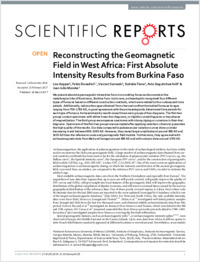Reconstructing the geomagnetic field in west africa: first absolute intensity results from Burkina Faso
- Kapper, Lisa National Autonomous University of Mexico (UNAM), Institute of Geophysics, National Archeomagnetic Service, Campus Morelia, Mexico, Morelia, Mexico
- Donadini, Fabio University of Fribourg, Switzerland
- Serneels, Vincent University of Fribourg, Switzerland
- Tema, Evdokia Università degli Studi di Torino, Dipartimento di Scienze della Terra, Italy
- Goguitchaichvili, Avto National Autonomous University of Mexico (UNAM), Institute of Geophysics, National Archeomagnetic Service, Campus Morelia, Mexico, Morelia, Mexico
- Morales, Juan Julio National Autonomous University of Mexico (UNAM), Institute of Geophysics, National Archeomagnetic Service, Campus Morelia, Mexico, Morelia, Mexico
-
28.03.2017
Published in:
- Scientific Reports. - 2017, vol. 7, p. 45225
English
We present absolute geomagnetic intensities from iron smelting furnaces discovered at the metallurgical site of Korsimoro, Burkina Faso. Up to now, archaeologists recognized four different types of furnaces based on different construction methods, which were related to four subsequent time periods. Additionally, radiocarbon ages obtained from charcoal confine the studied furnaces to ages ranging from 700–1700 AD, in good agreement with the archaeologically determined time periods for each type of furnace. Archaeointensity results reveal three main groups of Arai diagrams. The first two groups contain specimens with either linear Arai diagrams, or slightly curved diagrams or two phases of magnetization. The third group encompasses specimens with strong zigzag or curvature in their Arai diagrams. Specimens of the first two groups were accepted after applying selection criteria to guarantee the high quality of the results. Our data compared to palaeosecular variation curves show a similar decreasing trend between 900–1500 AD. However, they reveal larger amplitudes at around 800 AD and 1650 AD than the reference curves and geomagnetic field models. Furthermore, they agree well with archaeomagnetic data from Mali and Senegal around 800 AD and with volcanic data around 1700 AD.
- Faculty
- Faculté des sciences et de médecine
- Department
- Département de Géosciences
- Language
-
- English
- Classification
- Geology
- License
-
License undefined
- Identifiers
-
- RERO DOC 288667
- DOI 10.1038/srep45225
- Persistent URL
- https://folia.unifr.ch/unifr/documents/305369
Statistics
Document views: 95
File downloads:
- pdf: 186
